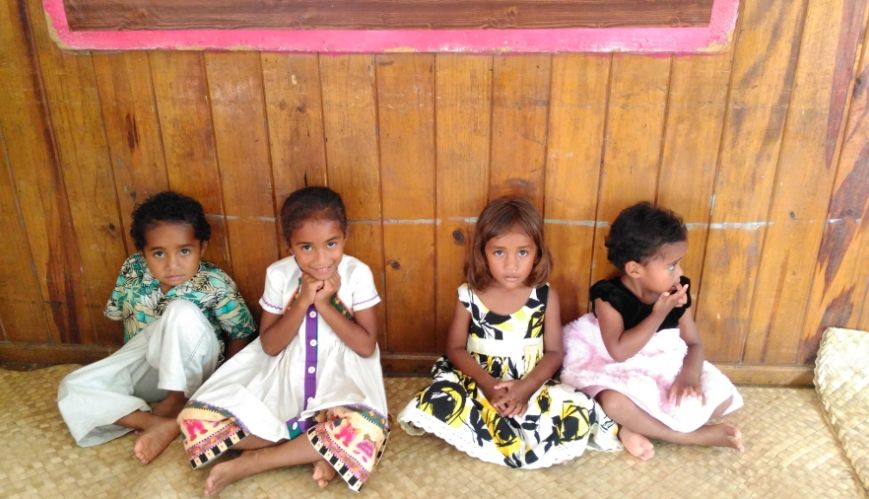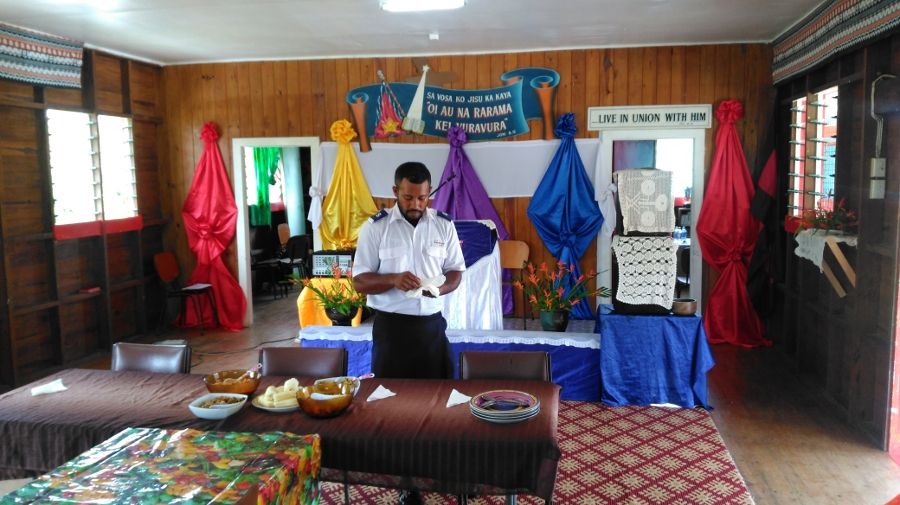Pointing people to Jesus in Fiji

Pointing people to Jesus in Fiji
23 February 2017
Some of the beautiful children who are part of the Lomaivuna Corps’ young people’s program.
By Captain Lusi Leqa
As you hit the gravel roads, houses become sporadic except for clusters of villages. The air is suddenly chilled as you ascend into the mountains of the province of Naitasiri, where Suva’s most remote corps, Lomaivuna, is located.
An hour’s drive from Fiji’s capital city, there’s a huge difference in the landscape. Where concrete buildings line the immediate view in Suva, all you see and experience on the way to Lomaivuna and at the corps itself is lush greenery and clean, fresh air.
The corps is not part of a village, but instead The Salvation Army leases land from a mataqali (clan). The land is perched on a hill overlooking other communities and farming settlements.
A Slice of Paradise in Lomaivuna
Lomaivuna is well known for its abundance of root crops and ginger production. The corps officers, Captain Jeremaia and Amelia Naviko, who were appointed there in 2016, are impressed that corps members take to their plantations daily – not only to cater for their own families but also to sell to middle-men. “We have learnt a lot from the people in Lomaivuna Corps. They are hardworking, they face lots of challenges, but this doesn’t stop them from coming to church and committing themselves to the things of God in the corps,” Captain Amelia said.
The corps sits on farm land, so Salvationists walk a long distance (up to an hour) to make it to Sunday church meetings. “They don’t wear their uniform when they leave home. They pack it away and come to the corps, because the road is mostly dirt of gravel, the dust is unbelievable and can cover the perfect white uniform turning it brown,” Captain Jeremaia said. “Sometimes, if the river is flooded, they have to wade across with water reaching their neck. This is the sacrifice they make willingly because they love the Lord Jesus Christ.”
Water supply has always been a problem in Lomaivuna. Even though the corps has water tanks, dry spells can still cause severe water shortages. When that happens, neighbouring communities converge on the Army asking for water for their families.
It can be tough sometimes, but the Navikos are enjoying ministry in Lomaivuna and their children are settling in well. “It was a big change for them at first, but they have come to love it and enjoy being here. We are in solitude here on the hillside, but we are seeing the blessings of God every day,” Captain Amelia said. “We believe with all our heart that wherever God places us, becomes your own slice of paradise. You just have to get on with the job and always know in your heart that God has a specific purpose for why he sends us where he does.”
 Lomaivuna Corps Sergeant Major Pauliasi Buli preparing for the Sunday meeting.
Lomaivuna Corps Sergeant Major Pauliasi Buli preparing for the Sunday meeting.
Love for the Army in Savusavu
Tucked away in the bay, sheltered by mountains, the first thing you wake up to in Savusavu is the beautiful scene of a glassy sea with yachts gliding gracefully, and local school children laughing and playing hop-scotch on the pavement leading to their school. You smell the sea, you hear birds, you hear neighbours shouting “Bula!”, and occasionally you hear a ship’s horn sound out loud and clear as it departs the local wharf.
Located on Fiji’s second biggest island, Vanua Levu, everything about Savusavu reflects a laid-back atmosphere. The Salvation Army is well respected and loved here. Although yet to be opened, the Army’s new complex is located in town. On the property is the hall and behind it is the officers’ quarters. The hall sits immediately opposite the town’s main wharf and travellers frequently ask about the Army’s programs and meetings.
Captain Viliame and Laineta Ramere are the corps officers. They are excited about the prospect of growth Savusavu presents. “Savusavu is known as the ‘Hidden Paradise’ because it is tucked away in Fiji’s Northern Division, while a lot of tourists go to the Western Division, where there are plenty of hotels,” Captain Viliame said.
“A big part of Savusavu is its youth and children. They make up majority of our numbers every week, and when we have tourists attending our meetings, they enjoy playing with the children and taking time to meet with the youth,” Captain Laineta added.
The Army’s men’s ministry in Savusavu gets involved in taro planting and fishing. They fish for their own livelihoods but also share their catch with widows and the elderly. “The sea around Savusavu is rich in sea life and food,” said Captain Viliame. “No one should get hungry in this place. We all know how to fish and get seafood, so we try to encourage our young boys to learn how to fish, how to go deep sea diving and to earn a living from that.”
Captain Laineta teaches people how to make craft from resources such as coconut fronds and coconut shells among other things. “All these crafts earn income for families and we really try hard to encourage the young people, young couples and families to learn these skills because they can sell what they make to earn money for themselves,” she said.
Savusavu is popular as a holiday spot for yacht owners from around the world. Salvationist Semi Were is the only qualified yacht serviceman in town. “Before any yacht is allowed to enter the Savusavu waters or bay, the Department of Biosecurity asks me to inspect them for any unwelcome algae or substance prohibited in our waters,” he said. Through his work, he has met many tourists who have since become friends of Savusavu Corps – some even calling it their “home away from home”.
“I enjoy inviting people to my corps,” Semi said. “I want them to come on Sundays, to enjoy time with the corps people, and they always end up staying to have lunch with us – even if it’s a simple meal of rice and curry, we share it with them. We want them to know Fijian hospitality. It might not be much, but it’s from our hearts.”
God’s provision for Sigatoka
Sigatoka Corps is a thriving corps in Fiji’s popular “coral coast” tourist area – in the foothills of world-renowned sand dunes. On their approach to the corps, visitors see farm houses of all colours and shapes, plots of sugarcane fields, cattle grazing and the occasional horse and rider making their way lazily along the side of the road.
Lieutenants Peniasi and Tavaita Torocake are the corps officers. In this, their first appointment out of training college, Sigatoka has already become home. “When we were first told we were going to Sigatoka, we had mixed feelings and emotions as we didn’t know anything about it. But as the months have rolled on, we see why God brought us here,” said a smiling Lieut Peniasi.
Their children are with them, with Salote studying journalism at the University of Fiji in Lautoka. “Salote and Simeli have both settled in so well here. Our home is always full of children that Simeli has invited over,” Lieut Tavaita says.
Those at the corps, particularly its women, are skilled at making things out of clay. Tavaita explains the process: “We have to get a special kind of mud from an interior part of Sigatoka. Women get into the river and dig out portions of mud from the bank or the bed of the river, we place it in the sack to be taken back to the corps. At the corps it is mixed with sand to give it a firm feel. From that point, it is ‘stood on’ to be kneaded. It’s not to be done by hand. This is a long process. We then form shapes: we make pots, sometimes we make beads that can be threaded into necklaces, and we make figurines – animal figures, flower vases and other things that can be used in the home and given as gifts.” Women in the corps also sell what they make as an income source.
“Life in Fiji is hard. And if you have no job, no skills, it can be overwhelming in a sense, so to see people able to earn some money from a resource that is readily available, blesses our hearts,” said Lieut Tavaita. “We are loving it here! The corps folks have become family. Together with them we are discovering God’s goodness, his provision and his faithfulness.”
The article first appeared in the New Zealand Warcry. You can read more at www.issuu.com/salvationarmynzftwarcry
Comments
No comments yet - be the first.